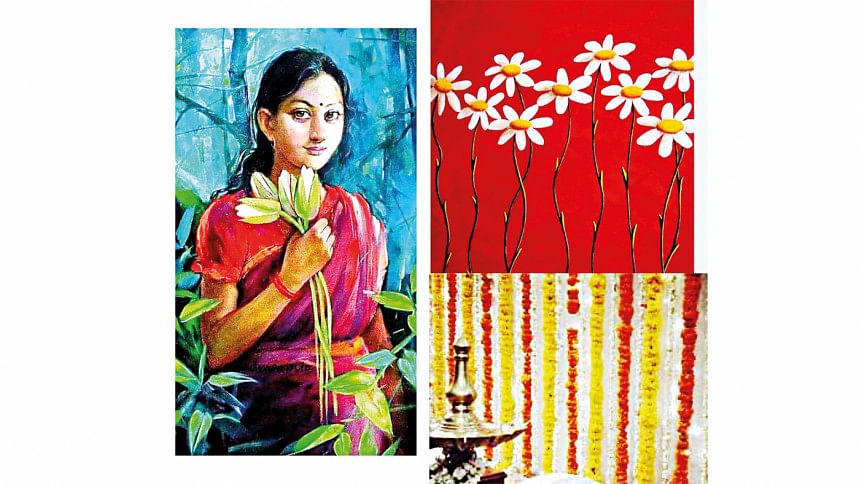Shohorbanu

"Bhabi, do you remember Banu?" my paternal aunt Janu phupi asks Amma. We are in the middle of a grand celebration—I am getting married and today is my gaye-holud. My grandmother barks, "Don't mention that ill-fated girl now. She tricked us all."
Phupi's face falls. She mumbles, "I recently learnt that her brothers kicked her out. She's in Dhaka but nobody knows where she lives."
A year went by when Reba Khala came to stay with us for a few days. Reba Khala was Amma's younger sister who lived in Dinajpur.
Everybody, including me, pretend we did not hear her. But I cannot forget Shohorbanu ever. How can I?
When she came to work for us, she was in her early-twenties. My mother was not too keen on having a young woman in the house, but grandmother said she would be good. And she proved to be true to Dadi's words—quiet, well-mannered and clean. She listened to Amma's instructions attentively and followed them. Two weeks went by and Amma was very happy.
Now what to call her? Shohorbanu was too long a name and sounded strange. I had laughed and asked if her parents knew that she would go to work in the city and hence they named her 'Shohor.' We started to call her 'Banu.' Soon, Banu learned to cook well, and Amma found a bit of a respite. My twin brothers kept Amma and Dadi quite busy and they badly needed a good hand in the kitchen. Everything was fine and six months passed by pretty quickly. I was about fourteen then and liked her a lot. She was not like the other maids we have had in the past. She knew how to read and write and she flipped through easy Bengali books every afternoon. She told me about her village in the northern district of Dinajpur and how she was married off very early, when she was only about eleven years old. Her husband was twenty-two and he was not at all happy with such a young bride. It was her mother-in-law who had chosen her and she apparently liked her a lot. She used to call her, "Chhotto bou." She told her son, "Wait a few years-- our Shohorbanu will be a lovely one."
I looked at Banu carefully. She had thick, black hair and dark eyes. She was beautiful. "What happened then, Banu?" I asked impatiently. "Didn't your husband love you when you grew up?" I wanted a fairy-tale ending. Maybe, her husband died later on, and that is why she was at our house as a maid-servant. But that would be later. Banu only smiled. She refused to give a complete story. She would stop at a climax and look away.
On one occasion, Banu revealed that her in-laws were into raising cattle. It seemed they were a well-to-do family. They had their own house, seven cows and twenty goats. There were also chickens.
"Banu, what did your husband die of?" Banu was busy chopping garlic and onion. She trembled and looked askance at me. "W.. what?"
"I said, how did your husband die?"
"I never said my husband died," came the somewhat faltering reply.
"Why did you leave the village then?"
Suddenly, Banu went absolutely quiet. Then at length, she said. "He married again. And my father brought me back home."
"What!!" I looked at her crestfallen. That was a terrible ending to my fairytale that did not even begin properly.
For the next few days Banu was grim and silent. I saw her looking far way when she went to the verandah to spread clothes on the wire. I asked softly, "Are you angry with me, Banu?"
She laughed. "It's my fate that went wrong. Why would I be angry with you?" Gradually, she became her usual self. But I kept on wondering if she still loved her husband. If she went back now, would she be able to live with her husband and have a baby? Maybe, she could chase away the other woman! In my childlike simplicity, I saw the other wife as the witch.
A year went by when Reba Khala came to stay with us for a few days. Reba Khala was Amma's younger sister who lived in Dinajpur. When she saw Shohorbanu, she almost jumped. "Shohor, what are you doing here?" She turned to Amma and said, "You didn't say Shohor was working at your place!"
Amma was surprised. "I told you that we have found a very good girl. How do you know Banu?"
Banu, at this time, had gone absolutely quiet. She was standing at the door of the kitchen with downcast eyes. Her big toe of one foot was busily digging at an imaginary crack of the floor.
Khala seemed very disturbed. She looked at Banu and without bothering to lower her voice she said, "Shohor almost killed her sister-in-law."
Both me and my mother jumped.
I blurted out, "That cannot be. She was very young when her husband remarried. Then her father took her home."
Reba Khala gave me a withering look and said, "Where did that story come from? Now get out of here."
My twin brothers kept Amma and Dadi quite busy and they badly needed a good hand in the kitchen. Everything was fine and six months passed by pretty quickly. I was about fourteen then and liked her a lot. She was not like the other maids we have had in the past. She knew how to read and write and she flipped through easy Bengali books every afternoon.
I was chased out of the room—they wanted adult talk. But was that even true? Banu, our devoted Banu was a murderess? How could that be?
I did not hear much except that Banu would have to leave. Nobody wanted to tell me anything, but finally, I cornered Banu on the roof. She was collecting her clothes in the evening. Before I could open my mouth, she said, "I tried to kill them both. My husband and his woman—he was in relationship with his elder brother's wife. I wounded them pretty bad, but they survived."
I was in tears when I asked, "Are you sorry, Banu?"
She shrugged. "I'm sorry they didn't die. Both she and I had to leave our in-laws house. No one wants a killer wife or daughter." She straightened up and looked at me, "No one wants a killer maid either."
She was right. I often wonder if my family thought that she would kill us?
I learnt later that her name 'Shohorbanu' or rather 'shouhorbanu' means 'a woman loved by her husband,' and not "shohor" as town or city. But instead of becoming her husband's beloved, she turned into a woman of the city.
A bizarre thought enters my mind as I sit all decked up—would I try to kill my husband if he has an affair with another woman? Will my family disown me if I do that? I feel dizzy. I wonder where life will take me. See how much trouble you left behind, Shohor? Here I am, a young woman of twenty-four, sitting on the dais on the occasion of my gaye-holud, but instead of a future full of light and laughter, I am thinking of a disastrous marriage and murder already.
Sohana Manzoor is Associate Professor, Department of English, ULAB. She is also the Literary Editor of The Daily Star.

 For all latest news, follow The Daily Star's Google News channel.
For all latest news, follow The Daily Star's Google News channel. 



Comments